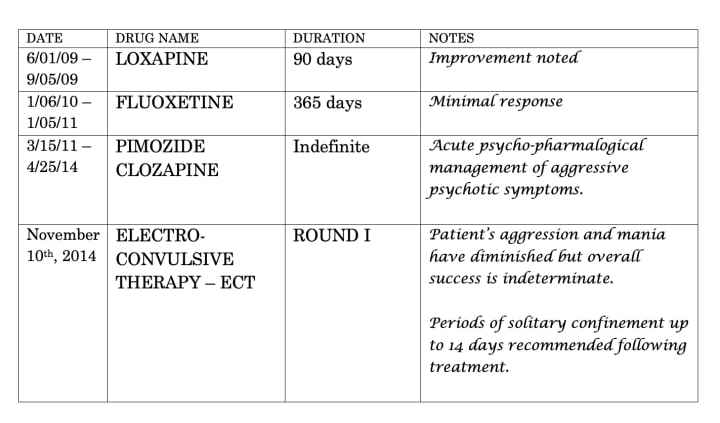The Witch of November
The lake never gives up her dead.

Water, black as the sky above, churns against the howling wind. It moves, swirls, crests, and crashes, heaving itself into the freezing night before falling again to the blackness below. Amid the snaking currents, waves of terrific height rise from the bottomless depths of this cold and infinite sea. Black rocks, jagged from eons of battering wind and water, protrude from the water’s surface like the teeth of vicious animals.
In this place, air, wind, and water combine in a vacuum of endless fury. There is no mercy and just malice as natural law reigns supreme.
In this place, there is a story to be told.
--
Black Rock Penitentiary | Munising, Michigan | November 2015
A Cadillac sedan pulls into the drive, headlights bathing the guardhouse in cold white light. The lone guard seated behind the glass switches on the intercom as the window of the sedan rolls down. A woman in a suit is behind the wheel, holding up a badge.
“Special agent, FBI. Seven-thirty to see the doctor.”
The guard opens the gate and the sedan hums along toward the penitentiary, situated on the precipice of a windswept cliff overlooking mighty Lake Superior. Even on a moonless night, ambient light shimmers faintly on the surface of the waves.
Inside the building, the night warden awaits her. "The doctor is already in session with her.” He brings the agent to a distant corridor. The halls are quiet and empty, save for the agitated flicker of lights.
They arrive at a heavy steel door that opens with a rusted creak, leading to an observation area with a one-way mirror. In the room beyond the glass, a doctor in a white lab coat observes a young woman. She is tall and skinny, with jet-black hair that falls to her waist and ribs that show against her bright orange jumpsuit. She rocks in her seat, arms clasped around her legs, eyes wide and unresponsive.
A man sits smoking a cigarette in the corner of the observation area, a manila folder perched on his lap. The warden indicates him.
“Insurance policy.” He hands the agent a file with dozens of papers, nodding toward the woman. “That’s her. Hasn’t said a word in days. She’s been that way since before I transferred from St. Ignace.”
The agent flips through the stack of papers. She knew that the woman had been incarcerated since 2005, first for accessory to armed robbery, then for violence and erratic behavior behind bars. She scans the files toward the end:

The agent stops to absorb the meaning of terms like ECT, psychotic, and solitary confinement. Her heart hangs heavy.
The warden shoots a dismissive glance at the charts. “She’s been on antipsychotic medication for years. ‘Brain pills,’ my old supervisor used to call them.” The agent studies the woman on the other side.
“Let me speak with her.”
“Good luck.” He flips a switch on an outdated control panel, opening a side door. The agent strides in and takes a seat next to the doctor. He smiles at her with piercing eyes behind small spectacles. His intense look and wild white hair make her feel uneasy.
The agent turns her attention to the woman. She decides to forgo the usual formality.
“I’ve come to speak to you about your father.” The woman, hearing the last word, freezes like a frosted pine in the dead of winter. A long and quiet moment passes.
“It can’t be,” she whispers.
“We’re certain it’s him.”
The woman shuts her exhausted eyes, gently shaking her head. A single tear trickles down her cheek.
“Where?”
“An art house in Southern California.”
The woman’s lips begin to tremble. She had long forced the memory of him from her mind. He existed as a vague concept, a distant nightmare from childhood. Remembering him now runs the risk of reopening wounds from many years ago.
The doctor sees a chance to insert himself. “Your father is the reason for your misery.”
Tears stream down her cheeks.
“Life has been very hard on you since your sixth birthday.”
She begins to shake.
“What did your father tell you before he left?”
Her mind is no longer in the penitentiary. It’s miles away, screaming through the November night, plummeting to earth as a fiery meteorite in the town where it all began.
--
Whitefish Bay, Michigan | July 10, 1995
“Happy birthday, Rosie.” Beth Whitcombe flashes the girl a smile of silver crowns, handing her a ragged, oversized teddy bear with torn seams. They’re inside a dim and dusty trailer in the boonies of Michigan’s Upper Peninsula. In a filthy loveseat in the corner are Rosie’s father, Gus, and three-year-old brother, Ash. Gus is shirtless and covered in tattoos while Beth has deep, dark circles under her eyes: evidence of terror in a life of no rest. Ash, too young to know and too much like his father to care, plays with Scrabble letters in a plastic cup:
H E W I E B T O C
Rosie hugs her mother. “Thanks, mama.” Beth feigns a smile. She lives in perpetual fear of the man, of his next outburst, his next bender, his next round of using her as a punching bag. Even after running away with Ash and Rosie, the County Sheriff always brings them back.
“Damned woman,” the fat deputy would say to Gus. “A woman like that with no place to go, no family to support her, running out from a hardworking local man.” Gus would nod in agreement, slurping a beer, caressing the tattoo of a witch on his forearm, the kind with a crooked nose and warts. He always had a knack for lying to people, of convincing them that things just weren’t so.
Beth turns to Rosie. “How about a cake down at the shore, maybe see the birds?”
“Big one or little one?”
“Big one. The one they call Gitche Gumee.” Rosie shrieks with joy and runs to the rusted Chevy outside.
Beth turns to follow her as Gus staggers to his feet, hammered on cheap whiskey. “Better have supper on by dark.” She nods in haste, slipping through the busted screen door. Gus takes another swig from a bottle of Deer Hunter while Ash fiddles with the letters in the cup.
On the rocky shores of Lake Superior, Beth skips a rock across the surface. The lake stretches to the distant horizon. It’s a world of water – a true inland sea. She finds a flat rock and hands it to Rosie, showing her how to skip it, but Rosie’s full-arm swing sends the rock plunging into the shallows.
Beth chuckles. “Just like the Edmund Fitzgerald.” She squints into the late afternoon sun. “This was long before your time, but my uncle was on the Edmund Fitzgerald when it sank. They brought up the ship’s bell last week right here in Whitefish Point – a whole team of divers and scientists and Coast Guard from both sides of the border.”
Rosie stands there on the shore, droopy bear in hand, listening but not understanding. A light breeze off the water blows her black hair into her eyes. She swats at the strands.
“Mama, what’s the bell?”
Beth flashes her a wide smile. “Rosie, you’re sharp as a tack.” She tosses another stone. It skips a dozen times before petering out, sinking into the clear water.
“It’s the bell from the Edmund Fitzgerald, a giant ship that sunk in November of ’75. A 100-year storm swept over this very lake, waves tall buildings.” She hums a riff from a tune. “‘Twas the witch of November came stealin.’” Beth kicks at the stones underneath her feet. “Even at 700-plus feet, she was no match for those hurricane west winds. She left Wisconsin with far too many tons of iron ore...”
She trails off. The air is damp and heavy with summer humidity. As sweat beads at her temples, she realizes how much she misses her uncle. She crouches by a bare patch of sand, using her long fingers to draw a series of circles inside one another.
“Your father said he was disgusted with them retrieving the bell. Says it violates old maritime law, disturbs the watery graves of all those men. Bad a man as he is, he should know: his father was aboard that ship, too.”
She finishes drawing the final circle. “I’m afraid he’s going to do something truly quite awful.” She shakes her head, trying not to cry. “Let’s go get some birthday cake.”
--
Later that night, Rosie was still awake when the sirens flashed. Blue and red lights danced around the trailer like a cheap disco in a dive bar. Boots thundered up the steps and into the trailer, tall officers bellowing “Police! Nobody move!” They found her on the bed, eyes wide as saucers. One of the officers snatched her up, his boot crushing a half-eaten birthday cake on the floor. Rosie didn’t remember much of what happened next; she was still in shock from what she had seen just a few hours earlier.
After returning home, her father went in a blind, drunken rage and assaulted her mother. Rosie did as her mother always said and ran to the edge of the wood to crouch in the tall grass with Ash. Her father could never find them there.
Over the years, Rosie did her best to forget the unspeakable evil that unfolded that night – an evil that rocked the region and forever altered the course of her life. The officers covered her eyes as they took her away, but she had already seen her: the body of her mother at the forest's edge, dead as rotting roadkill. She was one of five that her father murdered on that darkest of nights, the others falling victim when Gus raided a nearby research station to steal the bell of the Edmund Fitzgerald. A statewide manhunt yielded nothing; Gus Whitcomb had slipped into the dark of night, deep in the Upper Peninsula, along with Ash, the 200 lb. bronze bell from the wreck, and a truck bed full of survival equipment.
On the edge of the wood, an investigator squat photographing crime evidence, including two lines of Scrabble letters:

As the initial horror subsided over the years and Rosie grew older, children in her class began to taunt her, first for being different, then for being a witch.
“Look at her black hair. Look at how thin she is.”
“I bet she has a nose she takes off in the morning.”
“No wonder she hasn’t got any friends. Who wants to be friends with a freak?”
“How much you wanna bet she put a spell on her dad and she’s the one who killed all those people?”
As their voices grew louder and their words more wicked, Rosie retreated into herself. She hated her foster parents, an older religious couple who lived in a town by the Wisconsin border, far from Whitefish Bay. They encouraged her to pray to God and ask for guidance. Instead, she skipped school and hung with the older kids who drank Bud and smoked moldy weed. They introduced her first to cigarettes, then to Colt revolvers. By the time she was 16, she was in juvie for accessory to armed robbery and assault.
10 years on, she had been on medication for several years in a psychiatric ward and undergone a round of ECT that left her feeling hollowed out. She longed for days outdoors and in the water, much like her childhood before her father fell into the abyss. Looking back, she realized that the warning signs were always there: that he was an evil man full of malintent. Wickedness coursed through his veins, just as it did in other killers that came before: Bundy, Berkowitz, Dahmer. He was no different from them.
--
A gentle shake brings her back to the present, memories dissipating from her mind. The agent stands over her, eyes wet with sympathy. At some point she had blacked out and ended up on her back. An intense throb rings around her skull; she must have hit the cold concrete floor on the way down. Laying there, she realizes how she hates her cell, the penitentiary, the malicious doctor who manages her case, the unfairness of it all. She dreads another evaluation, another antipsychotic, another spiteful glance from the guards. In a life of confinement, degradation, and violence, she yearns to be free.
For the first time, Rosie meets the agent’s look. “All my life, the legacy of my father and the story of that ship have hung over me like bad omens.” She searches for the right words. “As the years go by, I feel like that ship: broken in two, slowly sinking, slipping into the black, icy depths.”
Rosie’s eloquence stirs the agent. She squeezes the poor woman’s hand. “What happened to you is horrific. But it’s in the past. You hold the key to your own future now.”
Rosie closes her eyes, breathing heavily. “They call me a witch for wanting to be a free woman.” The agent furrows her brows, trying to understand.
“You can be free, Rosie. You just have to do as they say.”
“As long as they are in charge of me, I have no chance of freedom.” The agent follows Rosie’s look to the doctor.
“Who are they?”
“The consortium,” Rosie whispers.
“Who?”
The doctor shoots to his feet. “Rosie, it’s time for your medication.”
“No, goddamn you.”
“You don’t have a choice.”
“I refuse. You’re an evil man – just like my father.”
“Rosie, don’t force me to call your friends.” He steps toward the women, looming over them. “Where is your father? What did he tell you?”
“Go to hell. Go to hell, all of you!” Rosie’s limbs jerk uncontrollably, flailing around. A bony fist narrowly misses the agent.
“Enough of this blasphemy.” The doctor pushes a button on the table. Within seconds, two guards appear and seize Rosie by her limbs. The agent tries to deescalate when a second pair of guards materialize and block her from interfering. Rosie screams as they drag her from the room.
The agent looks at the doctor in distress. “Where the hell are you taking her?”
“Certainly not to hell.” The smile has vanished from his face. As he wipes the lenses of his spectacles, his expression contorts and twists. “We’re taking her in for a second schedule of ECT. Long overdue. It’s the only thing that can save her now.”
The agent’s face flushes red with anger. “Another round will fry her brain.” She stands face to face with him. “Without her, our chances of getting her father are as good as gone.”
“Your case matters little to our work here.”
“You can’t do this. Legally speaking, you can’t.”
“That’s why we have him.” He motions toward the glass, now clear and transparent. The man with the manila folder stares at her with a smile.
“Court order. No relatives -- none we can find, anyway -- and she’s in no condition to consent herself.” A thin smile appears on the doctor’s face. “It’s what she deserves.”
--
As the technicians fix the electrodes around her scalp and the anesthesia sets in, Rosie recalls the last encounter with her father before he vanished. He had found her and Ash in the woods, bloodied hands reaching for them in the grass, the tattoo of the witch on his forearm cackling silently.
“Just as the song goes, Rosie, ‘The lake never gives up her dead.’ Nobody but the dead and God know the terror of death.” He snatched the teddy bear from her arms, slurring his speech. “I'm taking Ash to Big Bear -- from one lake to another.”
Rosie repeats the words now. “Taking Ash to Big Bear, taking Ash to Big Bear—"
A technician slips a bite guard into her mouth and black paddles around her temples. “We’re clear in 3, 2, 1—”
The first round of electricity jolts her brain and body, extinguishing the sights and sounds in her mind, catapulting her to a place of infinite darkness.
--
Early the next morning, the doctor stands on the edge of the cliff overlooking the vast lake. Distant storm clouds gather on the horizon. The agent approaches him.
“It’s cruel what you’ve done to her, even if it holds up on legal grounds.” She bites her lip, channeling the hate she now feels for this man. “You should have given me more time.”
“That woman had her chance. You weren’t the first who tried to get a straight answer from her. She had years to come good, to be pure, but she corrupted her own spirit with sin and bad temperament.”
The agent watches the waves crash against the black rocks far below. Howling gusts of wind from across the great inland sea bite her cheeks, numbing her senses.
“I almost wonder if the real witch is somewhere out there, hidden in the depths of this mighty lake.” She kicks a stone over the cliff’s edge. “But maybe there is no witch. Maybe it’s just the wickedness of men, the hate in their hearts.”
The doctor scoffs at the suggestion. “That’s what they want you to believe; the songs, the mythology, the wicked society in which we live.”
“You do realize that I’ll have to come back once she recovers.”
“I’m afraid there won’t be much left of her.”
“Or your conscious.”
The doctor shoots her a piercing look. “Hold your tongue and follow protocol. I’ve seen young, ambitious women in your position before.” He turns to head back to the penitentiary. “Just remember this: here, there is no story to tell.”
About the Creator
Pohai Müller
I believe we’re only as old as we feel, and that each person has a story to tell.
Swiss-American, currently based in Northern Michigan.
Portfolio... pohaimuller.com
Blog......... pohaimuller.wordpress.com






Comments
There are no comments for this story
Be the first to respond and start the conversation.